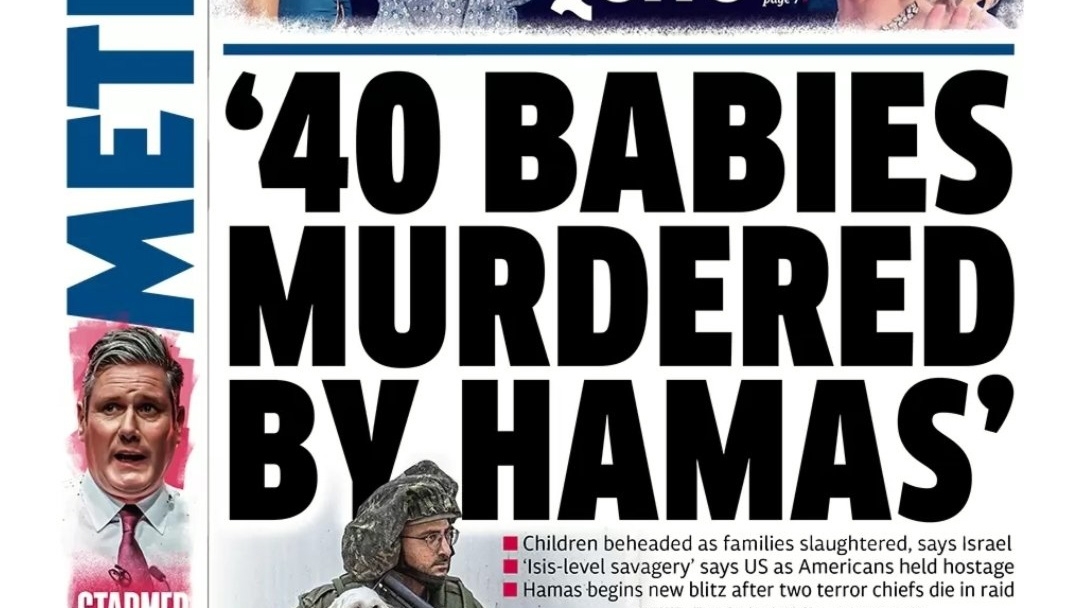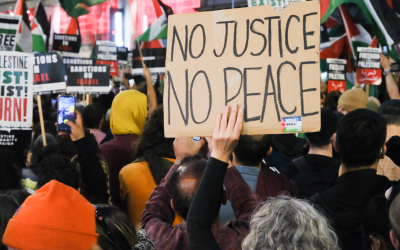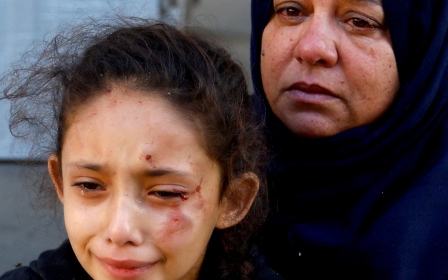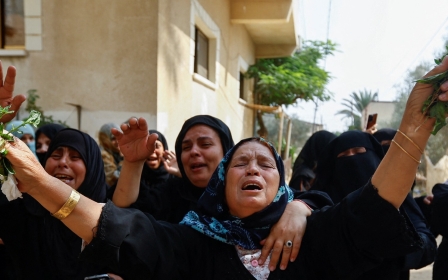UK media: When anti-Muslim hatred fuels hostility to Palestinians

“The idea of that is so far away from the western idea of nurturing your children and keeping them safe,” said the “first lady of Fleet Street”, Eve Pollard, commenting on a story about a female Islamic State (IS) terrorist blowing herself up.
BBC presenter Vicki Young responded: “Muslims would say that family and peace is part of their religion, it is not just a western thing.”
This was in 2019, weeks after a white supremacist in New Zealand massacred 51 Muslims, including a three-year-old boy, at two local mosques.
The fact that a prominent British journalist like Pollard espoused such views, which give the impression that westerners are uniquely good, is disturbing, given that these are the people deciding what sort of news reaches the masses.
That’s perhaps one reason why an unsubstantiated story alleging that 40 babies were beheaded by Hamas militants at the Kafr Aza kibbutz on Saturday made the front pages of half a dozen major British newspapers on Wednesday.
New MEE newsletter: Jerusalem Dispatch
Sign up to get the latest insights and analysis on Israel-Palestine, alongside Turkey Unpacked and other MEE newsletters
According to the investigative outfit Grayzone, a key source for this claim was a deputy commander of the Israeli army “who also happens to be an extremist settler leader who incited violent riots against Palestinians in the occupied West Bank earlier this year”.
The journalist who first amplified the claims works for the state-sponsored Israeli broadcaster i24. Meanwhile, senior journalists from some of Britain’s best-known news outlets, including Sky News and the Guardian, lambasted the irresponsible media coverage of something that has not been verified independently.
Some have compared the situation to war propaganda of the recent past, including the debunked claims about weapons of mass destruction in Iraq in 2003, and false reports that Kuwaiti babies were tipped out of incubators by Iraqi soldiers during the 1990-91 Gulf War.
'Racist stereotyping'
But there is another context in which these horrific headlines were published. As the Guardian’s Jerusalem correspondent, Bethan McKernan, noted in a social media post: “It’s about the racist stereotyping of Arabs and conflating all conflicts in the Middle East as the same thing.” Anti-Muslim hatred fuels anti-Palestinian sentiment.
This has been seen in the coverage following the Hamas breakout from Gaza, with high-profile British journalists responding furiously to the murder of Israeli civilians by accusing Muslims of being in the “grip of a death cult that sacralises bloodshed”, and describing the attacks as “Islamic bloodlust” - something veteran journalist Peter Oborne has said is arguably a form of “blood libel”.
Follow Middle East Eye's live coverage for the latest on the Israel-Palestine war
The outrageous statements, which many would see as unadulterated Islamophobia - things one wouldn’t dare utter about another religion or people - have proved rather uncontroversial among the mainstream media classes. One of the editors who made such comments was swiftly invited onto BBC Question Time, once again showing that beyond having no consequences in the British media, Islamophobia offers opportunities.
These are a few of the most transparent examples, but anybody watching or reading the wider range of “news” on UK media platforms can find a daily staple of broadsides.
This murder of innocents was given the shortest of shrifts before the presenter asked whether Zomlot condoned the Hamas attacks
One of the latest salvos on GB News came from former Labour MP Simon Danczuk, who used the current conflict to decry the failure of multiculturalism - and he did so by placing blame specifically on Muslim communities.
“Terror on the streets of London”, screamed another headline atop a photo of a pro-Palestinian protester with his index finger raised. GB News equated this to an IS gesture, despite the fact that the raising of the index finger, focused on the oneness of God, is used by Muslims around the globe on a daily basis in actions such as prayer. Portraying this as a symbol of terrorism shows the willingness of some media outlets to smear Muslim beliefs and practices.
Many who feel helpless at the onslaught of biased and offensive media coverage are now being gaslit with suggestions such as those found in a recent Daily Telegraph editorial, which demanded that the BBC use the word “terrorism” in covering the Hamas attacks because “anti-Semitism cannot be ignored for fear it may upset some British Muslims” - as if media outlets or politicians have ever cared about upsetting British Muslims.
Shutting down debate
But we have been here before. The “war on terror” that followed the 9/11 attacks in New York was not just an invasion of several Muslim countries and the mass murder of mainly Muslim civilians. Also complicit in the war were the newspapers and television channels that permitted Muslim and anti-imperial voices to speak, on condition that they first condemn.
This is similar to the recent questioning of the UK’s Palestinian ambassador, Husam Zomlot, who spoke on BBC television about six of his relatives being killed in Gaza just hours before his interview. This murder of innocents was given the shortest of shrifts before the presenter asked whether Zomlot condoned the Hamas attacks.
Others have suggested that the road to peace is through a just settlement for both sides, and that the people of Gaza shouldn’t suffer for the actions of Hamas. But even this is no longer good enough, as Guardian columnist Owen Jones discovered when he tried to mention the massacres and war crimes being committed against Palestinians in Gaza during a Sky News segment.
Jones started his argument by condemning in no uncertain terms the atrocities committed by Hamas against Israeli civilians. But he was still asked repeatedly to condemn - and his real crime, according to MP Margaret Hodge, was that he had an “obsession” with Palestine.
Some of the arguments being made by Palestinian advocates are no different than those being made by former Israeli military members. Shlomo Brom, the former head of strategic planning for the Israeli army, wrote in the Economist this week that “Israel was led to this grim situation by the failure of its policies towards the Palestinians”.
Brom’s good fortune is that in making such an argument, he doesn’t get labelled a terrorist sympathiser. The long “war on terror”, which seeks to shut down any such talk, means that Muslims and advocates for Palestine are almost always hit with that label.
The views expressed in this article belong to the author and do not necessarily reflect the editorial policy of Middle East Eye.
Middle East Eye delivers independent and unrivalled coverage and analysis of the Middle East, North Africa and beyond. To learn more about republishing this content and the associated fees, please fill out this form. More about MEE can be found here.






